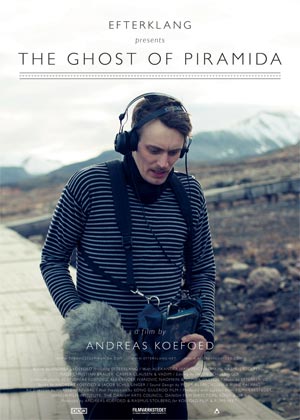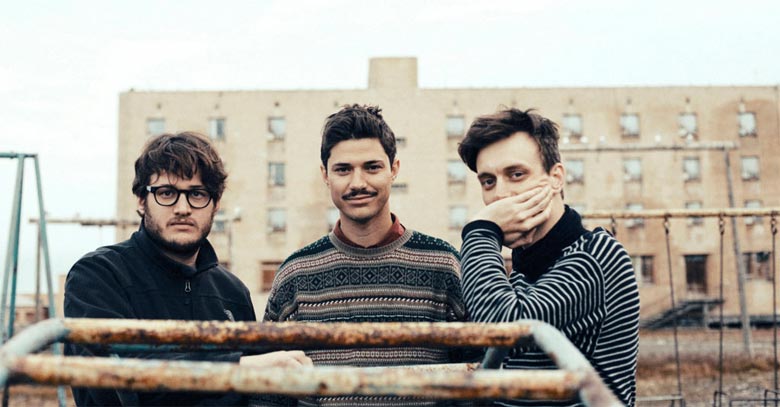When the collection process was complete, the band took the field recordings back to their home in Berlin and began to assemble their treasures into an album. The challenge in the studio was to make something musical out of the sounds that also spoke to the enormity of the space from which they were obtained — but transforming sonic events into musical ones was a familiar part of the Efterklang process because of their prior experiences.
“We have always used field recordings – especially in the electronics we create and use on our albums,” says Stolberg. “They are very often based on our field recordings.”
Piramida, however, is a record teeming with organic power and, more than just a collection of songs, it speaks to the art of the album as a whole.
“We definitely make music with the album as our driving force,” asserts Stolberg, “The album is a strong format.”
EFTERKLANG BAND INTERVIEW CONTINUES BELOW
The Ghost of Piramida: The Film
 Once completed, the release of Piramida coincided with a film entitled The Ghost of Piramida, directed by Andreas Koefoed. The documentary film follows the narrative of an elderly Russian man’s former life in Piramida, while simultaneously detailing the band’s progress in the location. Viewing the film, one can sense the profound effect disinvestment has on human life in a city that has become financially irrelevant – contrasted by the band’s intent to make it vital once again, however temporarily. The music in the film incorporates both early sketches as well as finished songs from album that seamlessly connect the initial stages of the project to the completed vision. In total, the band spent nine days in Piramida and collected more than 1,000 sound recordings.
Once completed, the release of Piramida coincided with a film entitled The Ghost of Piramida, directed by Andreas Koefoed. The documentary film follows the narrative of an elderly Russian man’s former life in Piramida, while simultaneously detailing the band’s progress in the location. Viewing the film, one can sense the profound effect disinvestment has on human life in a city that has become financially irrelevant – contrasted by the band’s intent to make it vital once again, however temporarily. The music in the film incorporates both early sketches as well as finished songs from album that seamlessly connect the initial stages of the project to the completed vision. In total, the band spent nine days in Piramida and collected more than 1,000 sound recordings.
The Ghost of Piramida strengthens the connection between this mysterious location and the recorded process. To further share this sense of connectedness, the band invited fans to host their own screenings of the film in living rooms, movie theatres, venues, and miscellaneous locales around the world — all of which were listed as private-public events on the project’s website. Having attempted a similar collaboration with Vincent Moon on the short documentary film An Island, Efterklang’s decision to implement this clever social model for a second time was an easy one; according to Stolberg, over 800 people screened The Ghost of Piramida.
Learn more about hosting a screening of The Ghost of Piramida.
Efterklang’s Discography
When the time came to perform Piramida live, Efterklang were presented with a new set of thrilling challenges. Moving away from an emphasis on distinct sounds, they shifted towards making sense of the songs within a performance context. Hoping to create a different experience, the band solicited the help of orchestras in each city for the Piramida concerts. The traditional instrumentation of the live orchestra provided an exciting juxtaposition to the “non-traditional” instruments used to create the album.
“For the album, we were trying to put more focus on the individual sound sources – where we earlier had been layering tons of things together, you, at the end, really can’t tell the instruments apart. That is also a nice approach, but not when you travel so far to get some interesting sounds. Then you want to make sure these songs have the space and time they need in the music,” explains Stolberg. “Having the orchestra project meant that we had a place to let off steam and take care of all our tendencies to add orchestral arrangements to our music.”
Efterklang’s approach to recording and performing might seem unorthodox and perhaps reinforces their reputation as “experimental”, but, as with any artist, experimenting is an essential element of creation and the true goal is to make something that is honest and meaningful. In the case of Efterklang, what results is a natural balance between experimentation and pop music, although maybe unintentionally.
“We don’t search for that balance. We search for music we feel like creating or we dream of music we could create and then we take a go at it,” says Stolberg. “When we all think we have some music or songs that resonate with us in a nice way — then we just hope it will resonate with other people too.”
In the end, whether by traversing frigid waters, playing forgotten pianos, and collaborating with international orchestras, Efterklang’s willingness to go to such lengths to satisfy their own curious souls results in music that is not only enjoyable, but also inspiring.
Piramida is lilting and beautiful; listening to it with knowledge of the context in which it was created only enhances the experience. It is as reverberant and exceptional as the ghost town from which it came.
Ω






